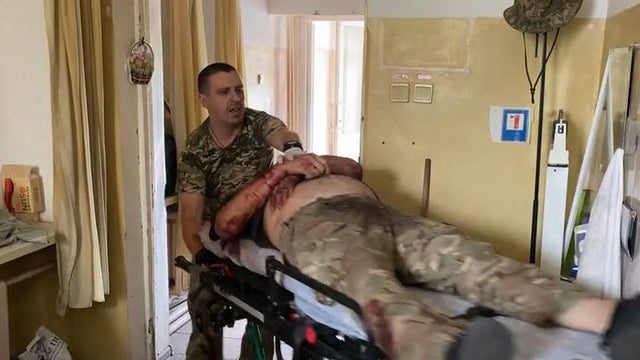Front-line Ukraine clinic hit with carnage from a cluster bomb strike

Eastern Ukraine — As he drank his coffee in the ramshackle clinic near the front lines of Russia's war on Ukraine, there was no telling what the day would bring for Dr. Oleksii and his skeleton staff. Their so-called "stabilization clinic," one of many up and down the 600-mile front, is the first stop for wounded soldiers coming from the battle — and for civilians caught up in the vicious fight.
The clinic has one vital, primary mission: "We stabilize," the Ukrainian doctor told CBS News. "So, if there are heart failures or blood losses, we bring the patient back to life and we take them further down the evacuation line."
It is their job to ensure casualties survive long enough to make the hours-long journey, further from the constant risk of Russian bombardment, to reach better-equipped hospitals.
We heard multiple explosions in the distance during our visit, but then there was something much louder, much closer.
The initial blast brought a sudden urgency, and the doctor ordered a couple members of his team to go and check it out. Then secondary explosions rang out. Weary Ukrainian soldiers seemed to know exactly what was happening.
The first of the injured were brought in, including a soldier who moaned in pain as medics, working in well-rehearsed efficient silence, cut off his clothes. Then more soldiers arrived, some of them gravely wounded.
As we watched, civilians started coming in. One elderly woman sat wounded in a wheelchair, begging anyone for help. Others were too badly hurt to speak at all.
It was just 20 minutes after we arrived that the explosion struck, only 200 or 300 yards away. From that moment, there was a steady flow of wounded coming into the clinic — soldiers and civilians alike.
We lost count of the number of people rushed through the doors, but it quickly became clear that this was another attack on a residential neighborhood.
"We have a cardiac arrest," shouted one of the medics. "Heart stopped for two minutes."
They started administering chest compressions as they looked for space to treat the person. The overwhelmed clinic had quickly become a battlefield triage point.
Amid the chaos, Dr. Oleksii and his colleagues were forced to make snap, life and death decisions about who was most likely to survive, and who was unlikely to make it out of the clinic.
The harsh reality of the grueling war was plain to see: Shrapnel wounds to people's heads, chests and limbs; arms and legs clamped to stop patients bleeding to death. Dr. Oleksii said it was all consistent with the carnage typically caused by cluster bombs, identifiable more by the sheer number of casualties than the type of injuries.
"The difference is only in how many injured there are," he told us, explaining that generally the injuries inflicted by cluster bombs are "the same as from a mine explosion and other munitions," there are just a lot more of them.
He wasn't in any doubt that one of the controversial weapons had been dropped near his clinic.
"They're used by the enemy a lot," he told CBS News. "It's not the first time, and not the last."
If not for the emergency treatment provided at the clinic, Dr. Oleksii said some of the people we saw being treated for horrific injuries "wouldn't have made it" to a hospital.
"Blood loss is enormous," he said. "In those injuries the first thing is to put the tourniquets on."
We asked him if he'd lost any patients after the bomb blast.
"Yes," he said. "It's war. People die."
The doctor said around 30% of the people brought into his clinic for treatment are civilians, "because the positions and the division lines are also in the same place as settlements, this means there are also civilians who suffer from the shelling. The first place they come when this happens, is here."
Despite the trauma of his work, Dr. Oleksii said there was no time to be tired, but other feelings do creep in, including rage at the devastation being inflicted on his country by Russia.
"For me, anger is like a motivating force," he said. "I just point it in the right direction."
The doctor said it was a hard day, but not the worst he'd seen. And he knows there may be worse yet to come.
source: https://www.cbsnews.com/news/ukraine-russia-war-cluster-bomb-damage-inside-a-front-line-clinic/